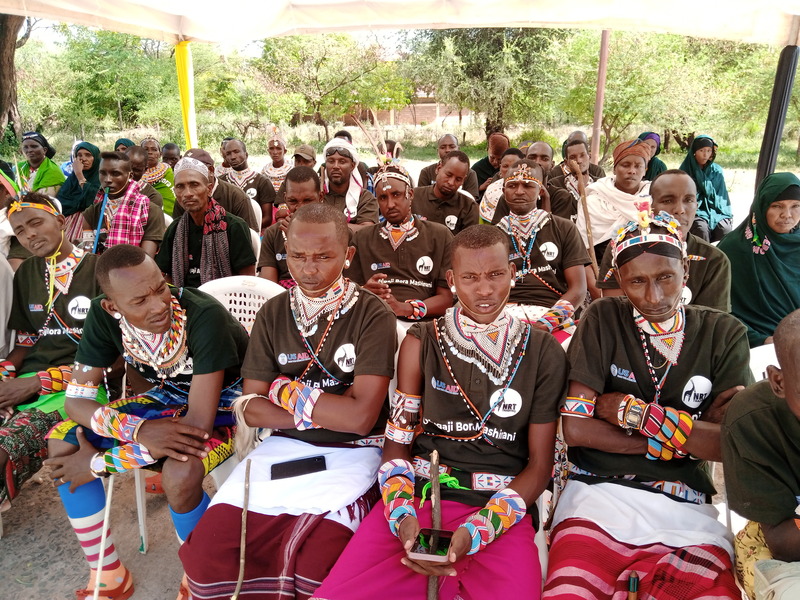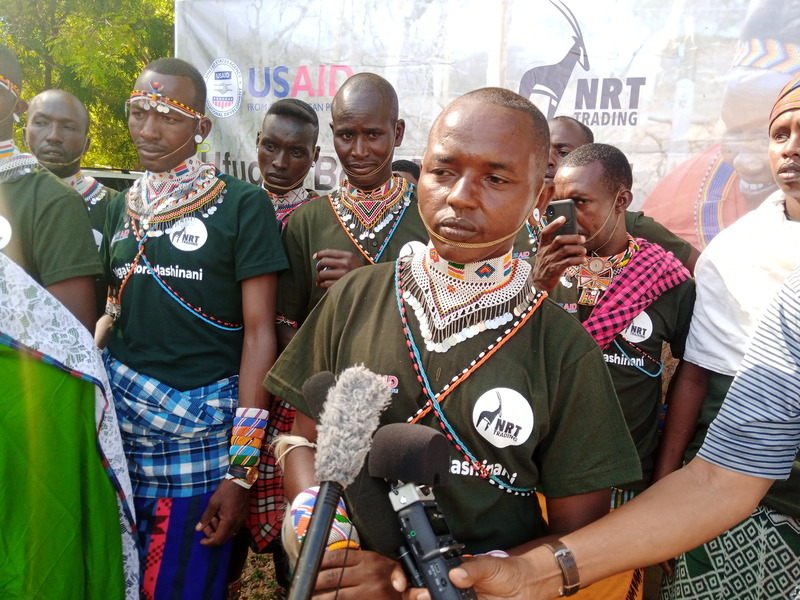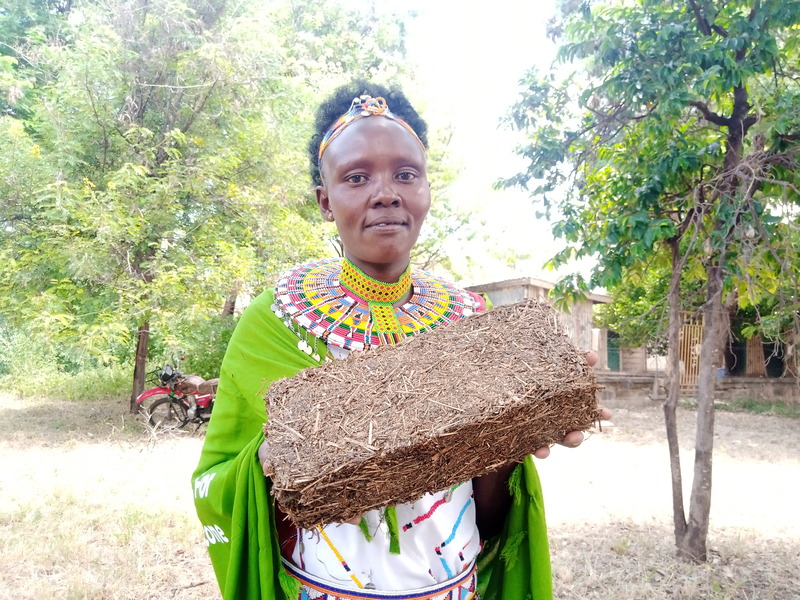300 herders graduate after training on modern livestock practices

The Morans are currently undertaking peace initiatives within the area in effort to lure other young men into abandoning harmful cultural practices.
Some 300 pastoralist herders from Isiolo, Samburu, Marsabit, and Laikipia counties have graduated with a certificate of prior learning after a three-year field practical training on livestock husbandry, feeding, and disease reporting for improved productivity and enhanced livelihoods.
With pastoralism, the region's main economic stay, under increasing threat due to climate change, insecurity, poor breeds, livestock diseases and unreliable markets, the training sought to enhance herders' capacity on breeding, diversification, drought monitoring, and response to eradicating poverty.
More To Read
- CS Kagwe urges bold reforms in agriculture sector as Intergovernmental Agriculture Forum opens in Naivasha
- Kenya wants China to remove tariffs on coffee, tea, avocados as trade imbalance persists
- City Hall moves to recognise urban farmers in policy review
- Isiolo courts investors as county pushes public–private partnerships in economic transformation drive
- CS Kagwe orders integrated pest management to save macadamia nuts
- Farmers accuse KTDA of favouring Eastern regions in bonuses
The Ufugaji Bora Mashinani Programme being implemented by the Northern Rangelands Trust Trading's Livestock department and funded by USAID Local Works Program, also incorporated gender inclusion in livestock production, with 55 per cent of the beneficiaries being women.
Besides being taught better livestock breeds, the herders also gained skills in fodder production and rangeland management to avert resource-based conflicts, market monitoring to know when to sell off their animals, and keeping fewer and manageable stock to evade losses when drought strikes.
Loimap Lekula, 29, from Sasaab village in Samburu East, said the training had offered him an economic lifeline, enabling him to shun cattle rustling.
"I am among a group of 30 Morans from Westgate (conservancy) who benefited from the training. We were taught about improving our local breed, fodder production, and vaccination of the animals to prevent diseases," Lekula said during the graduation at Kambi Garba in Isiolo.
 Loimap Lekula, a Moran, and other graduates of Ufugaji Bora Mashinani Programme speak to journalists during their graduation at Kambi Garba in Isiolo on March 20, 2024. (Photo: Waweru Wairimu)
Loimap Lekula, a Moran, and other graduates of Ufugaji Bora Mashinani Programme speak to journalists during their graduation at Kambi Garba in Isiolo on March 20, 2024. (Photo: Waweru Wairimu)
The Morans are currently undertaking peace initiatives within the area in effort to lure other young men into abandoning harmful cultural practices.
Lekula said he sold all his goats after realizing they were of poor breed and bought the hybrid Somali (Galla) goats that are resilient to changing climatic conditions and opportunistic diseases, produce relatively more milk, and have a high twinning rate, which allows rapid population growth.
Another graduate, Grace Titayo Meitiaki from Laikipia, is currently producing animal feed blocks for sale on her one-acre farm.
"I am happy that my husband allowed me to attend the classes that ran three times a week. We have been producing the feed together," the 38-year-old said, calling on pastoralist communities to allow women to make decisions over their lives.
Due to patriarchy, girl education is disregarded, with the majority marrying off at an early age as women are required to cook and take care of the animals and have limited access to and control over resources.
The herders were provided with gadgets for disease surveillance and reporting for action by the veterinary department in the respective counties.
"We take pictures (using smartphones) and send them to the NRT-T team that helps us get the required drugs for animal health," Jelina Lekiluai from Sera Community Conservancy in Leerata said.
 Grace Titayo hold a sample of animal feed blocks that she has been producing after receiving training under the Ufugaji Bora Mashinani Programme during their graduation at Kambi Garba in Isiolo on March 20, 2024. (Photo: Waweru Wairimu)
Grace Titayo hold a sample of animal feed blocks that she has been producing after receiving training under the Ufugaji Bora Mashinani Programme during their graduation at Kambi Garba in Isiolo on March 20, 2024. (Photo: Waweru Wairimu)
NRT-T CEO Vshal Shah said the training was geared towards strengthening livestock value chains for improved household income.
"Use the skills for improved livelihoods and income," he told the graduates, adding that the programme would spur development in Northern Kenya and boost the local economies.
Isiolo Deputy County Commissioner Patrick Musango said pastoralist communities must embrace modern practices to avoid losses when natural catastrophes strike.
"We must abandon nomadic pastoralism and embrace zero grazing so that we reduce the risk of our livestock being stolen by rustlers. We also must invest in education because it will help Morans shun cattle rustling and promote development in our region," he said.
Ufugaji Bora Mashinani Program Director Wario Sake appealed to the local communities to utilize the graduates for improved livestock-keeping practices.
NRT-T Chairperson Kevit Desai said the curriculum that was used to train the herders, a majority who have never set foot in a classroom, was in line with the government's competency-based policy.
"We are helping them to diversify into commercial livestock keeping and they can further the training they have received through the national education system," Dr Desai, who was accompanied by NRT boss Tom Lalampaa, said.
The benefiting conservancies were Songa, Jaldesa, Kalama, Biliqo Bulesa, Shurr, Ltungai, Naibung'a, Sera, Westgate and Melako.
Elmi Bishar, a director at the State Department of Livestock Production, announced a raft of measures by the national government to enable pastoralists in Northern Kenya to improve their productivity, including the provision of 2 million sexed semen to 31 Arid and Semi-Arid counties and an embryo transfer programme.
"This will improve the quality of breeds and ensure our people reap maximum benefits by producing quality livestock products," Bishar said, adding that a national annual vaccination programme will protect animals from various diseases.
Announcing that Isiolo County had been selected as a meat hub in the country, the official, who represented Agriculture PS Jonathan Mueke, said 450 feed lots would be established in the 31 counties to enable livestock farmers to benefit from the value chain.
With the Isiolo export abattoir nearing completion, he said, all the neighbouring feedlots will feed the facility.
He said the local meat production of 464, 000 metric tonnes was way below the demand which stood at 660, 000 metric tonnes, citing animal breeding, fodder farming, and value addition as ways to sustain the demand.
Top Stories Today
















































